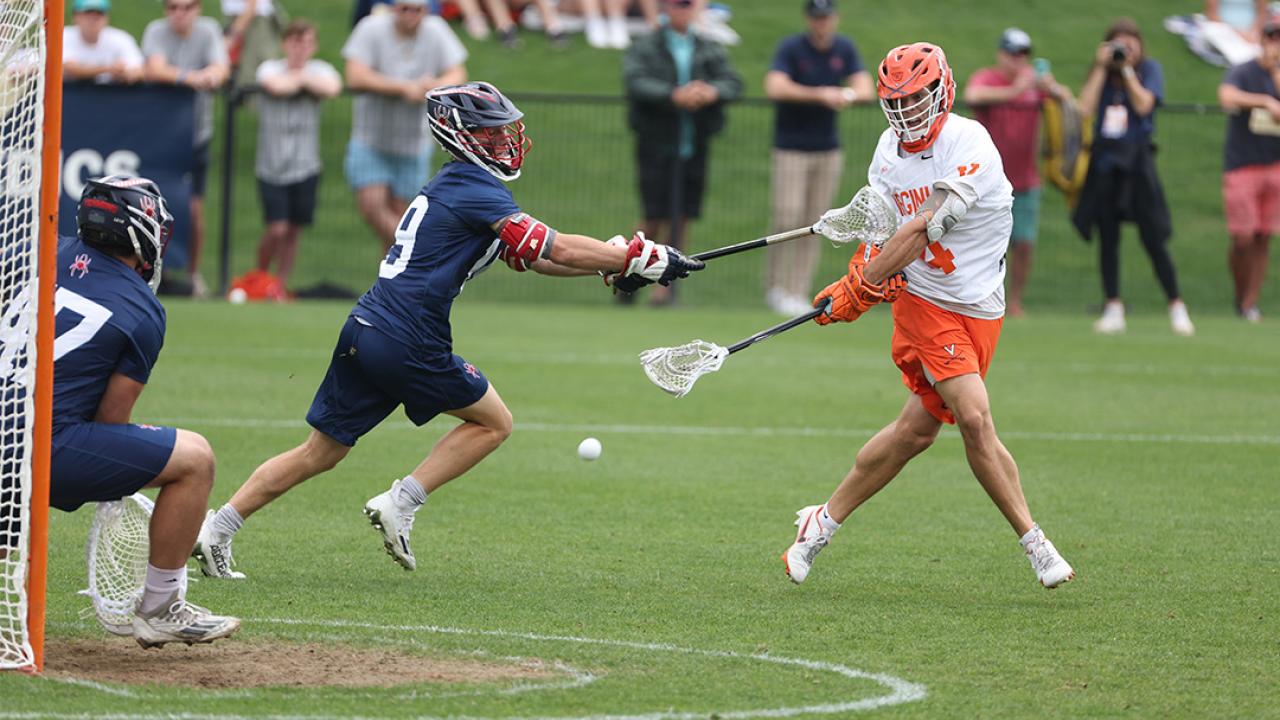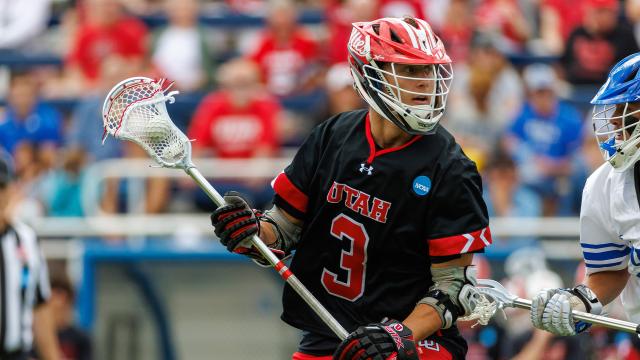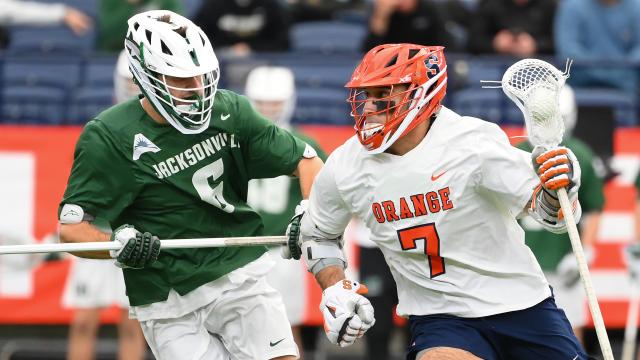
D-I Men's Rewind: Quarterfinal Field Drastically Different Than Last Year
Next weekend’s NCAA men’s lacrosse quarterfinals are going to look a lot different than last year’s — and not just because there is no undefeated juggernaut in sight.
Only one of last year’s quarterfinalists — Virginia — is back in the second weekend of the tournament. Maryland? Gone in the first round, the first defending champion bounced so early since North Carolina in 2016.
Cornell, Princeton and Yale, part of last year’s six-team Ivy League contingent? All sent packing as this year’s Ivy contingent was swept away one by one.
Delaware, a surprise quarterfinalist in 2022, nearly replicated its play-in game rout/first-round upset route before falling to Duke. And Penn and Rutgers didn’t even earn NCAA invitations.
It’s the first time in tournament history with only one repeat quarterfinalist from the previous year. Only three times before — 1990, 2007 and 2008 — had just two of the final eight come from the previous season’s quarterfinalists.
It’s also the first time since 2007 that none of the previous year’s final four advanced to the quarterfinals.
As for who’s still standing, it’s a lot of brand names. Three teams from the ACC (Duke, Notre Dame and Virginia) advanced, as did three Big Ten schools (Johns Hopkins, Michigan and Penn State). Big East champion Georgetown is a known quantity and was just in the quarters two years ago, and Army has more all-time victories than any Division I program not named Johns Hopkins, Syracuse or Maryland.
It will be a fresh look in Albany, N.Y., on Saturday and Annapolis, Md., on Sunday, but no name tags will be needed. A lot of knowns made it out of the first round, just not knowns that enjoyed tournament success a year ago.
BEST GAME
Michigan outlasts Cornell
This was not an easy choice, not when all four games in the top half of the bracket were decided by one goal and Georgetown erased a five-goal deficit and beat Yale 19-17. But the game that deservingly went to overtime gets the nod after the Wolverines earned a 15-14 victory.
There were 10 ties and neither team ever built a lead of more than two goals. It was a clean game, with just 23 turnovers between the two and no penalties in sight. It featured the eighth-seeded Big Red hoping it could get back to Memorial Day and Michigan trying to win a game in its NCAA tournament debut.
Billy Coyle’s goal with 59 seconds forced the extra period for Cornell, but Peter Thompson won it 80 seconds into overtime for the Wolverines. One unusual part of Thompson’s goal, at least for Sunday: It was assisted. All but nine of the game’s 29 goals were unassisted.
NOTABLE NEAR-MISS
Duke squeaks past Delaware
If there was one thing no one should have doubted, it was the Blue Hens’ belief they could reprise their run from last season. They had won at second-seeded Georgetown in the first round and tested Cornell in the quarterfinals in 2022, and with a ruthlessly efficient attack and one of the best defensemen in the country (Owen Grant), they weren’t going to be intimidated by a trip to Duke.
And when Delaware led 8-4 a little more than 20 minutes in? Well, the Blue Hens had everyone’s attention — including the Blue Devils.
Even with Duke largely forcing Delaware into making one-on-one plays and disrupting the Blue Hens’ ability to spin the ball around the field, the top seed found itself trailing 10-9 with 10 minutes to go. Duke got the next three goals and held on for a 12-11 victory as Andrew McAdorey (three goals) sprinted for about 30 seconds to run out the clock. But it was not a relaxing tournament opener for the Blue Devils.
BIGGEST SURPRISE
A catch-22 for Hopkins
There were plenty of reasons to believe Johns Hopkins would advance in its first NCAA tournament home game since 2018. Its depth stood out, as did its consistency over the last two months against an unforgiving schedule with few places to hide.
But for the Blue Jays to score their most goals since the 2005 NCAA tournament first round against Marist and rattle off 15 consecutive goals in a 22-8 pummeling of Bryant? Can’t say that was anticipated.
There were only three blowouts in the first round, and it didn’t seem like Hopkins would produce one of them when it trailed 3-2. But its passing was brilliant and the America East champion Bulldogs were sloppy and careless, and that combination proved ideal fuel for a record-setting day at Homewood Field.
SURPRISE THAT WASN’T
Army bounces Maryland
Sometimes, you just have to trust what your eyes tell you. Those who saw Army, especially over the last month, knew the Black Knights were solid everywhere, had answers on faceoffs and in the goal and were unlikely to be overwhelmed by any moment.
Anyone who saw Maryland in the second half of the season knew it was anyone’s guess which version of the Terrapins would show up. They were beleaguered by injuries at the defensive end, and lacked the alpha figure on offense they’ve come to be known for (though Braden Erksa could well be that guy moving forward).
The result was that Army pounced early, ran past Maryland’s defensive midfielders for much of the night and could summon an answer every time the Terps flirted with a run. The Black Knights (13-3) wound up with a 16-15 victory and their first quarterfinal appearance since 2010, while Maryland’s attempt to defend its national title ended in the tournament’s first weekend.
BEST INDIVIDUAL PERFORMANCES
Payton Cormier, Virginia
While the most welcome part of Saturday’s blowout of Richmond for Virginia was Connor Shellenberger continuing to get back on track, Cormier did his part with a six-goal showing. He scored all five goals for Virginia in a 14-minute stretch that saw the Cavaliers’ advantage grow from 11-5 to 16-7.
Knox Dent, Army
OK, the goal the senior accidentally kicked into the net was a new one, especially for him. But there was far more good than bad for the Black Knights’ goalie, who made 16 saves to spur Army’s 16-15 victory at Maryland.
Ethan Long, Penn State
The sophomore came into the tournament with 12 goals on the season. He scored five times on seven shots in the Nittany Lions’ 13-12 defeat of Princeton, eventually drawing a pole after helping to spur Penn State’s rally from a six-goal hole.
Will Lynch, Notre Dame
Conventional wisdom suggested that maybe — maybe — Notre Dame would be vulnerable to Utah’s faceoff game. Then Lynch went out and won 15 of 19 draws as the Irish effectively polished off the Utes by the end of the first quarter.
Coulter Mackesy, Princeton
The Tigers’ star attackman broke Princeton’s single-season scoring record with his six-goal showing in a 13-12 loss at Penn State. Mackesy finished the year with 55 goals, and the half-dozen goals against the Nittany Lions puts him in the company of Tiger legends Jesse Hubbard and Chris Massey as the only Princeton players to hit that plateau in the postseason.
Russell Melendez, Johns Hopkins
What’s the solution to this equation: Melendez + five goals + four assists = ...? Just the Blue Jays’ single-game postseason points record. Several players had delivered eight points in an NCAA tournament game for Hopkins, most recently Dan Denihan in 2000.
Peter Thompson, Michigan
The Ann Arbor native played four years at Georgetown before taking a fifth season at Michigan, and he scored four goals (including the overtime winner) and added an assist in the Wolverines’ NCAA tournament debut.
TEWAARATON WATCH
Tucker Dordevic, Georgetown: The graduate student scored six goals, including four during a stretch when the Hoyas rallied from an 8-3 deficit to tie it at 9 against Yale. Dordevic is up to 63 goals on the season, Georgetown’s single-season record.
Pat Kavanagh, Notre Dame: Three goals, four assists, business as usual for the Fighting Irish star. It was a spread-the-wealth sort of day for Notre Dame as it scored the first eight goals in a 20-7 pummeling of Utah, and Kavanagh did his share to help the Irish advance.
CJ Kirst, Cornell: The Big Red’s star had two goals and an assist on 10 shots while committing two turnovers in an overtime loss. Given the award’s long history of going to a player whose team goes deep into May, that probably ends Kirst’s chances of winning this season.
Brennan O’Neill, Duke: It wasn’t the most statistically prolific tournament opener for O’Neill, who had a goal and three assists against Delaware. But his one score was a deft bit of agility and stickwork off a loose ball and put the Blue Devils ahead for good in the fourth quarter.
Connor Shellenberger, Virginia: Shellenberger adjusted to the swampy field conditions in the Cavaliers’ 17-8 defeat of Richmond, delivering two goals and four assists. It is the first time all season Shellenberger has posted at least four points in three consecutive games, and Virginia is going to have the version of the redshirt junior that can dodge to both feed and score, it is going to be a handful and then some over the next two weeks.
NUMBERS OF NOTE
1
Goal margin of victory for top-seeded Duke against Delaware, the closest a No. 1 seed has come to losing in the first round since the tournament expanded to 16 in 2003. The previous closest call was in 2015 when Notre Dame upended Towson 12-10.
7
Years between NCAA tournament victories for any service academy team, a streak ended by Army’s 16-15 triumph at Maryland. It was the first time an academy team won a postseason game since 2016, when Navy toppled Yale 13-10 in the first round. That was the second-longest academy drought in tournament history, behind only the 11 years between Army’s first-round defeat of Maryland in 1993 and Navy advancing past Penn in the first round in 2004.
16
Years to the day between NCAA tournament victories at home for Georgetown, which rallied past Yale 19-17 on Saturday. The last time the Hoyas won a postseason game on the Hilltop was May 13, 2007, when they outlasted Princeton 9-8 in overtime in a first-round game.
16-4
Record for No. 4 seeds in the first round of the tournament since it expanded to 16 teams in 2003. Maryland became the first No. 4 seed to lose its opener since Yale fell to Navy in 2016. The other No. 4 seeds to stumble in the first round were 2008 North Carolina (against Navy) and 2014 Penn (against Drexel).
36
Goals scored in Georgetown’s 19-17 defeat of Yale, the fifth most in an NCAA tournament game. The record is 38, set in 1994 (Johns Hopkins’ 22-16 victory over Towson in the first round) and matched in 2019 (Yale over Penn State 21-17 in the semifinals). There have also been two 37-goal games: Syracuse winning 21-16 in the 1992 semifinals against Hopkins, and Yale outlasting Penn 19-18 in the 2019 quarterfinals.
58
Goals for Virginia attackman Xander Dickson, who broke a tie with Doug Knight (56 goals in 1996) for the most in a season by a Cavalier with a two-goal showing Saturday against Richmond. The fifth-year player had 52 career goals coming into the season.
Patrick Stevens
Patrick Stevens has covered college sports for 25 years. His work also appears in The Washington Post, Blue Ribbon College Basketball Yearbook and other outlets. He's provided coverage of Division I men's lacrosse to USA Lacrosse Magazine since 2010.

Categories
Tags
Related Articles



